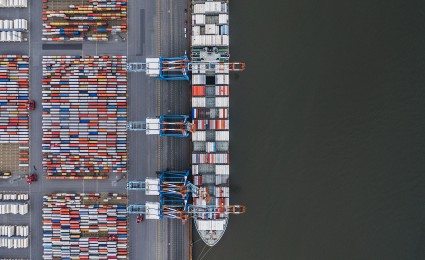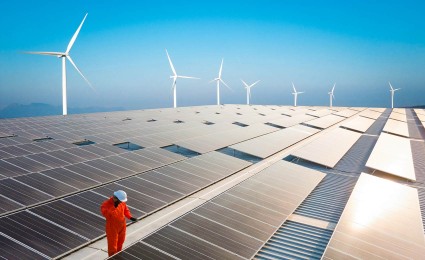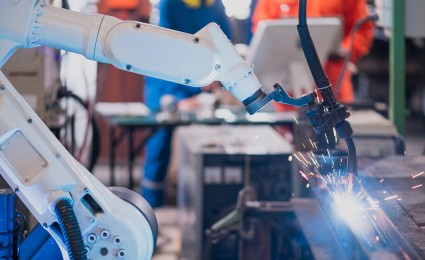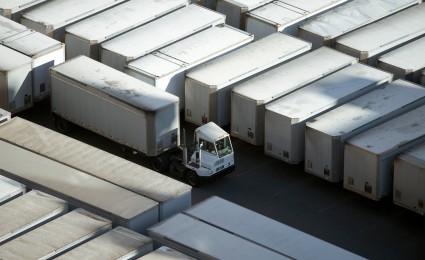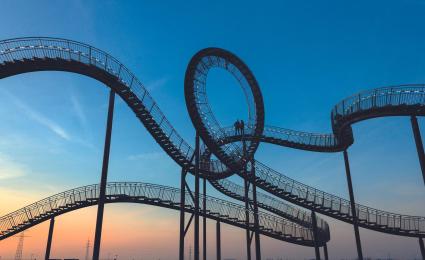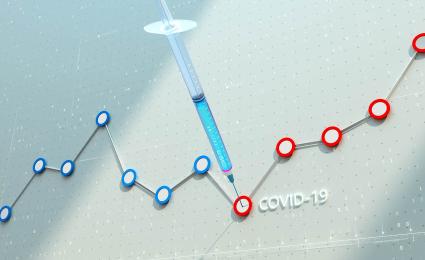
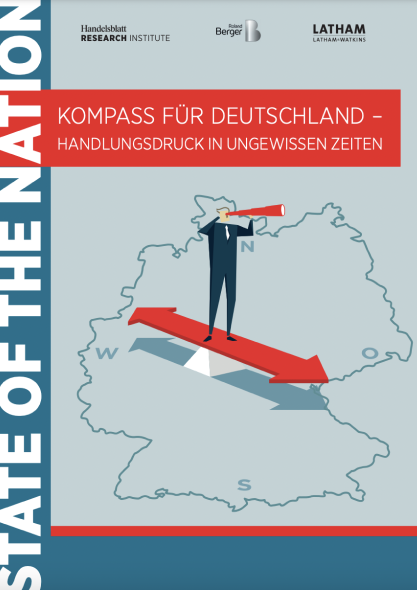
Global crises and their impact on business and the economy
Roland Berger crisis modeling: How companies can better manage risks
Rarely have there been so crises happening at the same time, and never have the challenges of our globalized world been more evident: the Covid-19 pandemic, supply chain problems, the Ukraine war, energy and raw material shortages, and massive inflation – all of these disruptive events are having immeasurable economic consequences worldwide. All major industrialized nations are equally affected: While the US is struggling with massive inflation and the European Union (EU) is additionally being tested by the Ukraine war, China's economy is slipping further back due to ongoing lockdowns under the country's zero-Covid strategy. As a result, GDP (gross domestic product) forecasts for Europe, China, and the USA are tumbling almost in lockstep and a "triple recession" is looming.

Four crisis scenarios currently pose a particular threat to economic recovery
Roland Berger, together with the risk experts at FutureValue Group, have examined the following four scenarios in detail as part of a stochastic modeling of economic development in Germany over the coming three years:
- Energy crisis: The Ukraine war has already caused energy prices to rocket; a possible extension of the embargo on Russia could lead to a supply squeeze, especially for energy-intensive industries.
- Geopolitical crisis: Conflicts in Europe, and possibly also in other regions of the world long term, lead to disruptions in global supply chains which result in bottlenecks that cannot be eliminated in the short term, such as for food, raw materials, semiconductors or electronic components.
- Interest rate crisis: With inflation already way above the assumed tolerance threshold of three percent, it is highly likely that the ECB will have to end its loose monetary policy and start raising interest rates. However, the later the ECB reacts, the more drastic the individual interest rate hikes will need to be. What this will do, among other things, is reduce demand for consumer durables.
- New Covid crisis: The emergence of new coronavirus variants may once again see restrictive measures taken, possibly going as far as regional lockdowns, including port closures and production stoppages, especially in zero-Covid countries like China.
Thus it appears that the Ukraine war could be just the beginning of an ongoing wave of crises. If the crises cited above happen or intensify, they will primarily affect sectors such as automotive, mechanical engineering, and steel owing to the fact that their value chains are globally integrated and they are already facing transformation pressures, e.g. as a result of the energy transition.
A look at the profitability of an average company in the German-speaking countries (DACH region) makes the precarious situation crystal clear: In order to maintain an EBIT margin of 8.4% in 2021 and compensate for the increased costs of energy, materials, staffing, and servicing the interest burden, the company would have to raise its prices by almost 7% in 2022. This is only realistic for the approximately 25% of companies with very high pricing power. What's more, sustained high inflation and rising interest rates not only put a strain on consumers' pocketbooks, but also increase financing costs for companies themselves.
The Roland Berger experts used a simulation model to analyze the overall impact of all four crises and construct three scenarios:
Baseline scenario:
The Ukraine war continues and the Covid situation does not improve noticeably until spring 2023. The economy stagnates in 2022, followed by a modest upswing. Moderate interest rate rises are sufficient, but inflation and oil prices remain high.
Stress scenario:
There are several mutually reinforcing global crises. Inflation is becoming entrenched, necessitating larger interest rate hikes, and the oil price remains high. This scenario suggests a looming three-year recession. It will take until 2024 to get back to 2020 levels.
Recovery scenario:
The Ukraine conflict is resolved quickly and no further crises materialize. There is a global economic upswing due to the post-Covid catch-up. Inflation levels off due to a drop in energy costs, interest rates remain at a low level, and the oil price normalizes.
Our scenarios offer a big-picture view. Drilling down to the details creates the following economic outlook for Germany up to 2024:
GDP:
In the baseline scenario, GDP increases only moderately through 2024, despite a catch-up effect in 2023. The excess burden compared with the recovery scenario equates to more than three percentage points of GDP. If the crises worsen or new ones emerge (stress scenario), there is every chance of a three-year recession with an impact of -5% this year. It will take until 2024 to get back to 2020 levels.
Inflation:
Inflation is very likely to exceed the 5% mark on average for 2022 and could even rise to over 7% in the stress scenario. Both the baseline and stress scenarios anticipate inflation falling slightly in 2023 and 2024 to below 6% and 4% respectively due to offsetting effects. However, it is highly unlikely that the ECB's price stability target of 2% will be achieved in any scenario.
Interest rate level:
The full impact of the interest rate hikes is not expected to be felt until 2023. In the baseline scenario, a nominal interest rate (3M Euribor) of around 1% can be assumed for the next two years. In the stress scenario, the interest rate could rise to over 4%, a level not seen since the financial crisis of 2008/2009.
Energy prices:
In the baseline scenario, the oil price (as a benchmark for energy prices overall) is expected to significantly exceed the all-time high of 2012 and fall again from 2023. In the stress scenario, by contrast, it will stay high at over USD 150 per barrel of UK Brent. Gas prices will remain high overall and show no appreciable decline.
German companies at a crossroads
German companies are thus at a crossroads. If there is a permanent crisis that lasts several years (stress scenario), businesses can expect to see a significant decline in GDP in 2022, difficulty in obtaining energy supplies, sharply rising financing costs, and an increased risk of insolvency.
The economy might even make a comeback (recovery scenario), but that is quite unlikely as things stand at present, because the crises do not appear to be resolvable in the short term and the risks from further geopolitical upheavals, massive interest rate hikes, and renewed lockdowns remain high.
The Roland Berger experts view a baseline scenario with continued solid domestic demand and stable exports as the most likely scenario currently. That said, companies will be burdened with higher financing costs due to rising interest rates. There is a risk of investment and innovation backlogs, which could lead to a loss of competitiveness .
Robust companies succeed even in times of crisis
Every crisis is also an opportunity, and companies can prepare for crises. However, the current high level of uncertainty requires a clear strategy and a new form of planning in order not to have to permanently adjust or even completely revise plans when risks materialize. Companies should therefore think in scenario terms and take account of all the relevant risks and high-impact events in their planning. The winners will be the companies that adapt fast, become more efficient, realize higher prices, and create robust structures to avoid supply bottlenecks and production stoppages. Businesses will also need a strong equity base and a diversified financing strategy to be able to hold out in the face of prolonged or tough crises.
360° perspective on tomorrow's world
This article is the starting point of a multi-part dossier on crisis scenarios and their impact on business and the economy.
Further topics we are working on:
- An analysis of the situation in Germany's leading industries automotive , trade and logistics and their key challenges, including digitalization and decarbonization
- An outlook on the impact of the crisis scenarios presented here on some of the most important economies worldwide (USA, CHN, UK, F, I, ES)
- A new entrepreneurial approach to crisis modeling and risk-adjusted planning that avoids risk blindness, increases planning process effectiveness, and makes managing uncertainty doable for companies
In addition, in our joint study "Compass for Germany – The pressure to act in uncertain times" you will find numerous pieces authored by our partners Handelsblatt Research Institute and Latham & Watkins on economics & policy and legal & regulatory topics, offering entrepreneurs and decision-makers a 360° perspective on the current state of the nation and tomorrow's world.
Register now to download our joint study "Compass for Germany - Pressure to act in uncertain times". You can find numerous articles on the current "state of the nation" as well as the global crises and their impact on companies and the economy.




